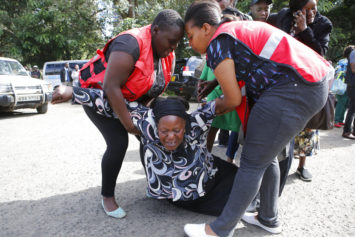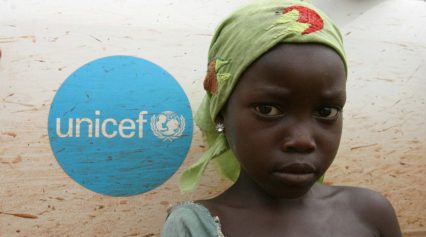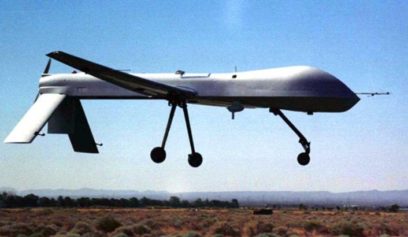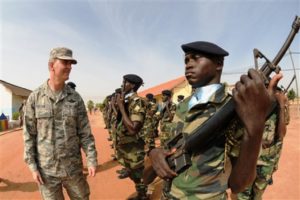
Source: United States Africa Command
Although the Trump administration has not expressed much of an interest in Africa, the U.S. has an increased presence in the continent. As China has ramped up its economic presence and enlarged its footprint in Africa, the U.S. is not waging economic war but rather a shadow commando war.
Uncle Sam is building a massive presence of the U.S. Army Special Operations Command as VICE news reported, with an unprecedented growth in deployment among elite units such as the Army Green Berets and Navy SEALs. While at least 116 special operations missions took place at once around the world in 2011, today these commando units are engaged in close to 100 missions in Africa alone. More specifically, 1,700 Americans are involved in 96 missions in 20 African nations at any one time, according to a declassified October 2016 document from the Special Operations Command in Africa, or SOCAFRICA. SOCAFRICA supports the United States Africa Command, or AFRICOM, which is responsible for Defense Department operations on the African continent. The U.S. military has divided the world into six geographic sectors — AFRICOM, NORTHCOM, PACOM, SOUTHCOM, EUCOM and CENTCOM. As reported by HuffPost, AFRICOM now maintains 46 U.S. military bases in 24 African countries.
The Government Accountability Office report on Special Operations Forces documented a dramatic rise of U.S. commandos in Africa, from 1 percent of all special forces abroad in 2006 to 3 percent in 2010 to over 17 percent last year. Only the Middle East has more elite U.S. forces conducting operations in its region.
Terrorism on the African continent is the reason for the deployment, according to the U.S. Special Operations Command, which lists by name the terrorist groups being fought, al-Qaida In the Lands of the Islamic Magreb, ISIS, al-Murabitun, Ansar al-Sharia, Boko Haram, the Lord’s Resistance Army and al-Shabaab. There are close to 50 terrorist organizations operating in Africa, according to The Intercept. Terror attacks in sub-Saharan Africa have increased from 100 per year in 2006 to nearly 2,000 in 2015, based on data from the National Consortium for the Study of Terrorism and Responses to Terrorism at the University of Maryland.
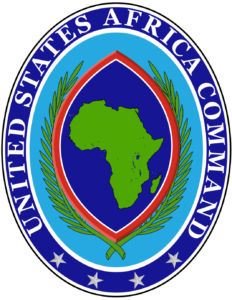
Seal of the United States Africa Command (Source: Wikimedia Commons)
“Our long-term vision is to enable and support our African partners to deter violent extremist organizations, achieve effective governance, promote future socio-economic development and protect the populace to achieve peace and prosperity in Africa,” reads the SOCAFRICA report, which declared that the U.S. is not at war with Africa, but its African partners are. SOCAFRICA says terrorist, insurgent and criminal groups are exploiting fragile environments in conflict: “Their goals are to expand illicit networks, establish safe havens, subvert legitimate authority, recruit and mobilize people and resources and to fuel crises to their advantage.”
The U.S. military claims it is countering violent extremism to allow African nations time to develop good governance and self-security. The report cites destabilizing forces that contribute to internal conflict and encourage popular uprisings and violent extremism, including corruption, poor government leadership, heavy-handed autocracies and socioeconomic inequality. External pressure from terrorists and foreign fighters, drug, weapon and human trafficking and illegal immigration pose a threat not only to African countries but to southern European countries, according to the report. These external factors also “contribute to security shortfalls, human rights violations, corruption and government mismanagement producing an environment conducive to subversion, military coups and mass atrocities.”
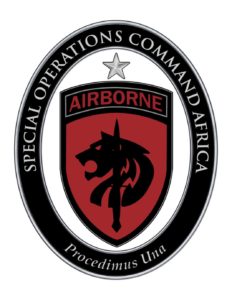
SOCAFRICA logo (Source: Wikimedia Commons)
Each region of the African continent faces its own challenges, the SOCAFRICA report notes. For example, North Africa, which is a major source of foreign fighters to Syria and Iraq, suffers from political instability and threats of violent extremism. Groups such as al-Qaida, ISIS and others are thriving in Libya. As The Washington Post reported in 2016, President Barack Obama secretly expanded its worldwide network of drone bases to Tunisia to conduct spying missions on Libya. In Western Africa, al-Qaida, Boko Haram and criminal organizations are gaining influence, fueled by inequality and ineffective governance. The Lord’s Resistance Army and criminal organizations operate in Central Africa, where they contribute to instability in already volatile places. In East Africa, where conflict is expected for the foreseeable future, the al-Qaida-affiliated group al-Shabaab is active in Somalia, Kenya, Djibouti, Ethiopia and Uganda.
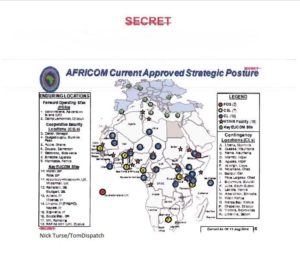
A map of U.S. military bases across the African continent in 2014 from declassified AFRICOM planning documents (Nick Turse /TomDispatch).
Obama intensified a clandestine, shadow war in Somalia in his final year in office, as The New York Times reported, using special operations, airstrikes, African allies and private contractors to fight militants in the Horn of Africa. Al-Shabaab was responsible for a number of attacks, such as a 2013 attack on the Westgate Mall in Nairobi, Kenya, that killed 60 and wounded more than 175. Last year, the group nearly brought down a Somali airplane with a bomb hidden in a laptop, and killed over 100 Kenyan troops before taking their vehicles and weapons.
In his “U.S. Strategy Towards Sub-Saharan Africa” in 2012, Obama said, “Africa’s economies are among the fastest growing in the world, with technological change sweeping across the continent and offering tremendous opportunities in banking, medicine, politics and business.” The threat of violence and disruption stemming from internal and external forces only serves to undermine that economic growth, giving the U.S. military an opportunity to wage a secret war on the continent, purportedly for stability and security in Africa, but most certainly for American geopolitical interests.
As Al Jazeera reported, AFRICOM is key to consolidating U.S. interests in Africa. North Africa has vast oil and natural gas reserves, the Sahara and the continent as a whole are rich in mineral resources and six of the 10 fastest-growing economies are located in sub-Saharan Africa. With oil and natural resources in Africa, the continent has major strategic significance that belies the official U.S. narrative that it is waging primarily a war on terror in Africa.
